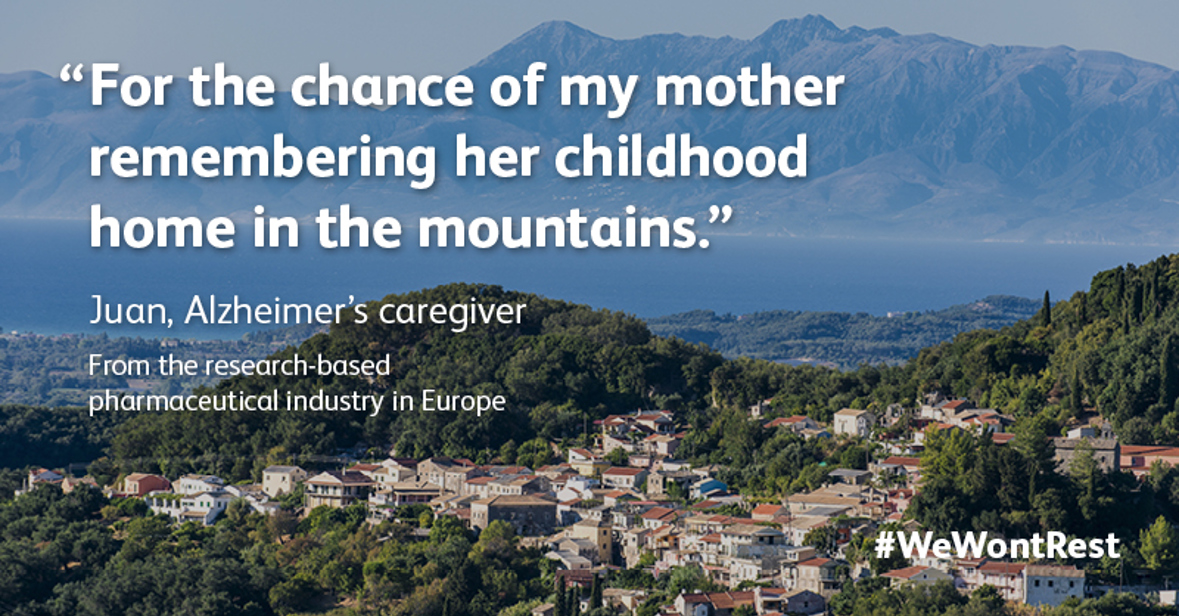#WeWontRest until Alzheimer’s patients have a brighter future
Taking action together to ensure a better today and tomorrow for people with Alzheimer’s disease
What is unique about Alzheimer’s disease
AD progresses in stages, with a long silent phase starting before its symptoms appear. Currently approved treatments help to alleviate some of the symptoms but there are no disease-modifying therapies (DMTs) that modify the disease, reverse or slow down its effects. Disease-modifying therapies would allow patients to live an independent life for longer, and maintain their cognitive capabilities and personality, leaving them more time with their friends and family.
The research community has traversed numerous frustrating setbacks over the past few years, which explains the long wait for a disease-modifying treatment. However, the history of Alzheimer’s Disease is a story of perseverance, commitment and hope. The industry’s dedication to finding a cure can be evidenced by the continued unfaltering drug development pipeline. In early 2020, there were 136 trials investigating AD therapies which have the potential to significantly reduce the burden on affected people living with the disease, their carers, and healthcare systems across Europe [3].
You can find out more about individuals commitment to tackling Alzheimer’s disease here.

It is time for European healthcare systems to prepare for Alzheimer’s breakthroughs
No organisation can address the challenges related to Alzheimer’s disease in isolation. As we have highlighted in the paper "Taking Action Together to Ensure a Better Today and Tomorrow for People with Alzheimer’s Disease", patients can only benefit from advances in treatment if healthcare systems are appropriately equipped to enable patient access to innovation along the whole of the disease pathway.
We are at a turning point in our fight against Alzheimer’s Disease. Long-awaited new therapies are on the horizon. The introduction of upcoming disease modifying therapies would have the potential to change the lives of both patients and carers and to substantially reduce the societal and economic burden of the disease.
For people living with dementia, their carers, and society to benefit from these innovations, clinical practice will have to transform and adapt. Healthcare systems in Europe currently lack the capacity to detect early, diagnose and treat AD effectively, hindering the ability to rapidly move a disease modifying therapy (DMT) for AD from approval into widespread clinical use. This could leave a large number of patients without access to transformative care when a DMT reaches the market.
To ensure we translate these breakthroughs into results for patients, Europe must prepare. 
19 Conversations | The EFPIA podcast series
Our latest publications
- Future-proofing the Alzheimer's disease healthcare journey get_app
- Rethinking Alzheimer's Disease White Paper, From Diagnosis To Care, 2024 get_app
- Rethinking Alzheimer's Disease White Paper, Detection And Diagnosis, 2023 get_app
- Early Detection And Diagnosis of Alzheimer's Disease get_app
- #WeWontRest until Alzheimer’s patients have a brighter future get_app
- Alzheimer’s Disease Health System Readiness – The Time to Act is Now get_app
- Taking Action Together to Ensure a Better Today and Tomorrow for People with Alzheimer’s Disease get_app
Future-proofing Alzheimer’s care: Scaling innovation for a healthier Europe.
Watch the webinar recording.
Videos
Blogs and press releases
-
Alzheimer’s disease: future-proofing the healthcare journey in Europe
A new EFPIA report highlights emerging best practices as novel therapies, biomarkers and digital innovations offer fresh hope for patients25.09.25Read Article -
‘I may have Alzheimer’s, but it doesn’t have me.’
What do patients want? Quality time with loved ones and hope for a meaningful life after diagnosis08.10.24Read Article -
Rethinking Alzheimer's Disease: A Call to Action for Early Detection and Diagnosis
Charting a course to improve early detection and timely diagnosis of Alzheimer’s in Europe21.09.23Read Article -
Improving Understanding of Epidemiology and Impact of Alzheimer’s Disease (Guest blog)
World Alzheimer's Day21.09.22Read Article -
Why don’t we have earlier detection of Alzheimer’s disease in primary care? (Guest blog)
The IMI funded MOPEAD project investigated the key challenges of Alzheimer's early detection, and recognised general practitioners as essential for the shift to timely diagnosis.29.09.21Read Article -
Alzheimer’s treatments in development could launch a new era in dementia care (Guest blog)
With new therapies on the horizon, we may be at a turning point. Patients, experts and industry agree that now is the time to prepare for a better future16.12.20Read Article -
Can we move towards earlier diagnosis for Alzheimer’s? (Guest blog)
If a new medicine can successfully slow the damage done by this progressive disease, early detection and timely diagnosis will be essential to deliver the prompt treatment patients need.26.11.20Read Article -
21 September is World Alzheimer's Day (Guest blog)
#WeWontRest in our mission to bring new hope to patients affected by devastating diseases with a high unmet medical need21.09.20Read Article -
Alzheimer’s disease: The importance of early diagnosis (Guest blog)
#WeWontRest until we succeed in making meaningful improvements to the lives of people impacted by Alzheimer’s disease, including their families.21.09.20Read Article -
Recent data has given both us and the Alzheimer’s community some hope in an environment where there has been little progress (Guest blog)
#WeWontRest until we can change the course of the disease for people living with Alzheimer’s disease and give them and their families a promising future.21.09.20Read Article
[1] Alzheimer Europe, Cost of illness and burden of dementia in Europe – Prognosis to 2030, www.alzheimer-europe.org/Research/European-Collaboration-onDementia/Cost-of-dementia/Prognosis-to-2030
[2] Alzheimer Europe, Dementia in Europe, Yearbook 2019, https://www.alzheimer-europe.org/Publications/Dementia-in-Europe-Yearbooks
[3] Cummings et al. Alzheimer’s Disease Drug Development pipeline: 2020, Alzheimer’s Dement. 2020;6:e12050

